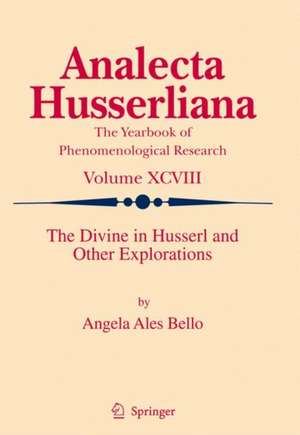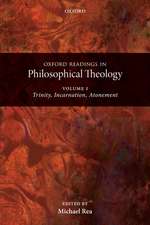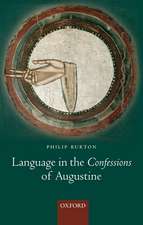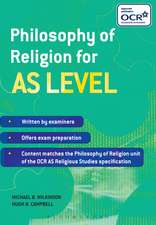The Divine in Husserl and Other Explorations: Analecta Husserliana, cartea 98
Autor Angela Ales Belloen Limba Engleză Hardback – 3 dec 2008
The second part focuses on the theme of religion as developed by Husserl in order to grasp the meaning of religious lived-experiences. Through an archeological excavation Husserl teaches us how to go to the bottom of the sacred and the divine in order to pinpoint their features and to comprehend their religious configurations in history.
In the third part one can find the application of husserlian hyletics and noetics to the field of the archaic sacred and of the different religious experiences. Some particular themes are treated such as ecstasy, contemplation, incarnation, and the relationship between the human being and the God from a philosophical and a religious point of view.
| Toate formatele și edițiile | Preț | Express |
|---|---|---|
| Paperback (1) | 634.68 lei 6-8 săpt. | |
| SPRINGER NETHERLANDS – 22 oct 2010 | 634.68 lei 6-8 săpt. | |
| Hardback (1) | 640.88 lei 6-8 săpt. | |
| SPRINGER NETHERLANDS – 3 dec 2008 | 640.88 lei 6-8 săpt. |
Din seria Analecta Husserliana
- 17%
 Preț: 524.11 lei
Preț: 524.11 lei - 24%
 Preț: 815.01 lei
Preț: 815.01 lei - 20%
 Preț: 570.73 lei
Preț: 570.73 lei - 15%
 Preț: 643.00 lei
Preț: 643.00 lei - 18%
 Preț: 1984.67 lei
Preț: 1984.67 lei - 15%
 Preț: 636.12 lei
Preț: 636.12 lei - 15%
 Preț: 643.84 lei
Preț: 643.84 lei - 18%
 Preț: 952.57 lei
Preț: 952.57 lei - 18%
 Preț: 1222.01 lei
Preț: 1222.01 lei - 18%
 Preț: 950.52 lei
Preț: 950.52 lei - 15%
 Preț: 642.18 lei
Preț: 642.18 lei - 24%
 Preț: 1072.13 lei
Preț: 1072.13 lei - 18%
 Preț: 947.67 lei
Preț: 947.67 lei - 18%
 Preț: 1225.94 lei
Preț: 1225.94 lei - 24%
 Preț: 1075.49 lei
Preț: 1075.49 lei - 18%
 Preț: 949.73 lei
Preț: 949.73 lei - 15%
 Preț: 647.59 lei
Preț: 647.59 lei - 20%
 Preț: 577.73 lei
Preț: 577.73 lei -
 Preț: 386.22 lei
Preț: 386.22 lei - 15%
 Preț: 651.19 lei
Preț: 651.19 lei - 18%
 Preț: 960.42 lei
Preț: 960.42 lei -
 Preț: 390.08 lei
Preț: 390.08 lei - 18%
 Preț: 1128.89 lei
Preț: 1128.89 lei
Preț: 640.88 lei
Preț vechi: 753.97 lei
-15% Nou
Puncte Express: 961
Preț estimativ în valută:
122.65€ • 127.57$ • 101.25£
122.65€ • 127.57$ • 101.25£
Carte tipărită la comandă
Livrare economică 14-28 aprilie
Preluare comenzi: 021 569.72.76
Specificații
ISBN-13: 9781402089107
ISBN-10: 1402089104
Pagini: 170
Ilustrații: XIV, 170 p.
Dimensiuni: 155 x 235 x 18 mm
Greutate: 0.43 kg
Ediția:2009
Editura: SPRINGER NETHERLANDS
Colecția Springer
Seria Analecta Husserliana
Locul publicării:Dordrecht, Netherlands
ISBN-10: 1402089104
Pagini: 170
Ilustrații: XIV, 170 p.
Dimensiuni: 155 x 235 x 18 mm
Greutate: 0.43 kg
Ediția:2009
Editura: SPRINGER NETHERLANDS
Colecția Springer
Seria Analecta Husserliana
Locul publicării:Dordrecht, Netherlands
Public țintă
ResearchCuprins
Thinking God.- Phenomenology as Philosophy Sui Generis.- Husserl’S Question Of God As A Philosophical Question.- Believing In God.- The Husserlian Approach to Religion.- Religion As The Object Of Phenomenological Analysis.- Some Explorations In The Phenomenology Of Religion.- Examples Of Archeological Excavation.- Ecstasy and Contemplation in Various Religious Experiences.- God as "Third" or as "You"?: Comparing Philosophy and Religion.
Textul de pe ultima copertă
Today, Western thought may be characterized mainly by two temptations. On one hand, greater importance is attributed to reason and, on the other hand, there appears more and more a tendency to renounce respond to the most important questions, among which we find the question of God. This produces a double result: fideism or atheism.
Edmund Husserl was able to go beyond this contraposition, digging inside human interiority to grasp the sense of human operations that lead to transcendence.
Angela Ales Bello, in the first part of her book, The Divine in Husserl and Other Explorations, provides a description of Husserl’s method in order to explain how he deals with the question of God from a philosophical perspective. The results from this investigation are compared with the main contributions of the philosophers of the past.
The second part focuses on the theme of religion as developed by Husserl in order to grasp the meaning of religious lived-experiences. Through an archeological excavation Husserl teaches us how to go to the bottom of the sacred and the divine in order to pinpoint their features and to comprehend their religious configurations in history.
In the third part one can find the application of husserlian hyletics and noetics to the field of the archaic sacred and of the different religious experiences. There are treated some particular themes as ecstasy, contemplation, incarnation, and the relationship between the human being and the God from a philosophical and a religious point of view.
Edmund Husserl was able to go beyond this contraposition, digging inside human interiority to grasp the sense of human operations that lead to transcendence.
Angela Ales Bello, in the first part of her book, The Divine in Husserl and Other Explorations, provides a description of Husserl’s method in order to explain how he deals with the question of God from a philosophical perspective. The results from this investigation are compared with the main contributions of the philosophers of the past.
The second part focuses on the theme of religion as developed by Husserl in order to grasp the meaning of religious lived-experiences. Through an archeological excavation Husserl teaches us how to go to the bottom of the sacred and the divine in order to pinpoint their features and to comprehend their religious configurations in history.
In the third part one can find the application of husserlian hyletics and noetics to the field of the archaic sacred and of the different religious experiences. There are treated some particular themes as ecstasy, contemplation, incarnation, and the relationship between the human being and the God from a philosophical and a religious point of view.
Caracteristici
A complete study of Husserl’s question about God, religion and the sacred An application of Husserl’s phenomenology to the analysis of the religions Relationship among Phenomenology of Religion, Cultures and Anthropology Relationship between Phenomenology and Human Sciences













